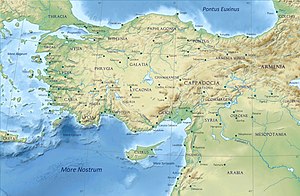Phrygians
Ancient Greek authors used "Phrygian" as an umbrella term to describe a vast ethno-cultural complex located mainly in the central areas of Anatolia rather than a name of a single "tribe" or "people", and its ethno-linguistic homogeneity is debatable.
[1] Phrygians were initially dwelling in the southern Balkans – according to Herodotus – under the name of Bryges (Briges), changing it to Phryges after their final migration to Anatolia, via the Hellespont.
Many historians support a Phrygian migration from Europe to Asia Minor c. 1200 BC, although Anatolian archaeologists have generally abandoned the idea.
[2] It has been suggested that the Phrygian migration to Asia Minor, mentioned in Greek sources to have occurred shortly after the Trojan War, happened much earlier, and in many stages.
[8] After the collapse of the Hittite Empire at the beginning of the twelfth century BC, the political vacuum in central-western Anatolia was filled by a wave of Indo-European migrants and "Sea Peoples", including the Phrygians, who established their kingdom with a capital eventually at Gordium.
According to Greek mythographers,[9] Midas had been king of the Phrygians, who were originally called the Bryges (Brigi) and came from the western part of archaic Thrace or Macedon.
Under kings alternately named Gordias and Midas, the independent Phrygian kingdom of the 8th and 7th centuries BC maintained close trade contacts with her neighbours in the east and the Greeks in the west.
Under the proverbially rich King Croesus (reigned 560–546 BC), Phrygia remained part of the Lydian empire that extended east to the Halys River.
There may be an echo of strife with Lydia and perhaps a veiled reference to royal hostages, in the legend of the twice-unlucky Adrastus, the son of a King Gordias with the queen, Eurynome.
The Phrygian language is a member of the Indo-European linguistic family with its exact position within it having been debated due to the fragmentary nature of its evidence.
Furthermore, Kortlandt (1988) presented common sound changes of Thracian and Armenian and their separation from Phrygian and the rest of the palaeo-Balkan languages from an early stage.
[6][17] Modern consensus regards Greek as the closest relative of Phrygian, a position that is supported by Brixhe, Neumann, Matzinger, Woodhouse, Ligorio, Lubotsky, and Obrador-Cursach.
[6][7][18][19][20] Based on an extremely slight archaeological record, some scholars such as Nicholas Hammond and Eugene N. Borza suggested that the Phrygians were members of the Lusatian culture that migrated into the southern Balkans during the Late Bronze Age.
[2] It has been suggested that the Phrygian migration to Asia Minor, mentioned in Greek sources to have occurred shortly after the Trojan War, happened much earlier, and in many stages.
[23] In her typical Phrygian form, she wears a long belted dress, a polos (a high cylindrical headdress), and a veil covering the whole body.
It shows her humanized though still enthroned, her hand resting on an attendant lion and the other holding the tympanon, a circular frame drum, similar to a tambourine.
[27] This king resided at Iconium, the most eastern city of the kingdom of Phrygia at that time, and after his death, at the age of 300 years, a great flood overwhelmed the country, as had been foretold by an ancient oracle.
Tantalus was endlessly punished in Tartarus, because he allegedly killed his son Pelops and sacrificially offered him to the Olympians, a reference to the suppression of human sacrifice.
In the mythic age before the Trojan War, during a time of an interregnum, Gordius (or Gordias), a Phrygian farmer, became king, fulfilling an oracular prophecy.
The mythic Midas of Thrace, accompanied by a band of his people, traveled to Asia Minor to wash away the taint of his unwelcome "golden touch" in the river Pactolus.
Quintus Smyrnaeus mentions another Phrygian prince, named Coroebus, son of Mygdon, who fought and died at Troy; he had sued for the hand of the Trojan princess Cassandra in marriage.
Herodotus[30] claims the priests of Hephaestus told him a story that the Egyptian pharaoh Psammetichus had two children raised in isolation in order to find the original language.





